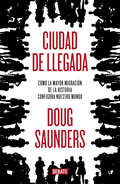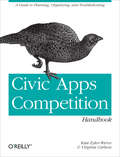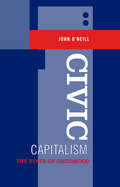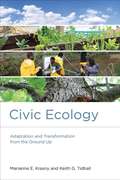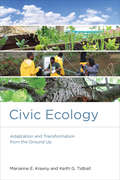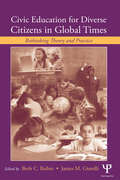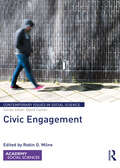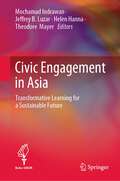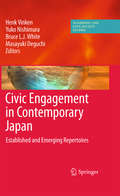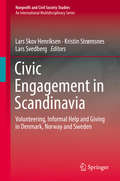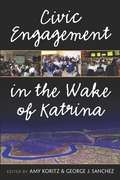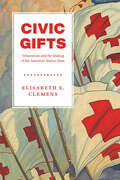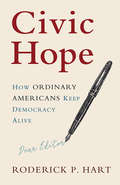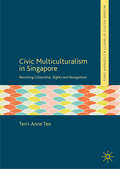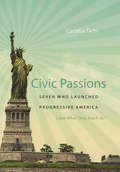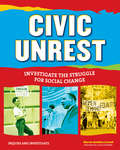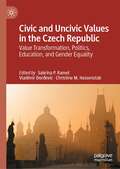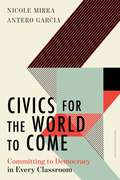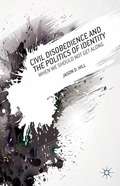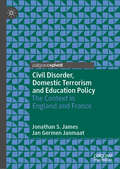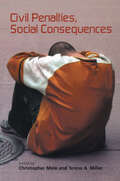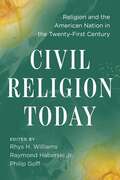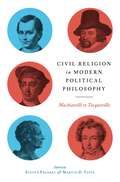- Table View
- List View
Ciudad de llegada: Cómo la mayor migración de la historia configura nuestro mundo
by Doug SaundersPor primera vez en la historia, más personas viven en las ciudades que en el campo, y muchas de ellas se abarrotan en los arrabales de las ciudades. Este movimiento migratorio, el más grande de la historia, afecta de forma directa a un tercio de la población mundial; una gran oleada que está creando nuevos espacios urbanos, lo que Saunders ha acuñado como "ciudades de llegada", focos de conflicto y cambio, centros ocultos de actividad febril que reestructuran nuestras ciudades y tr ansforman nuestras economías. De Estambul a Los Ángeles, de Varsovia a Shenzhen, Doug Saunders muestra cómo el éxito o el fracaso de estas inmensas comunidades surgidas en los márgenes de las ciudades tradicionales tienen un profundo efecto a escala local, regional y global.Ciudad de llegada, que obtuvo el premio Donner al mejor libro de no ficción y fue finalista de los premios Lionel Gerber y Shaughnessy Cohen, es un fascinante recorrido por los lugares clave de esta migración final y exploralas posibilidades, los riesgos y las dificultades inherentes al desarrollo de un nuevo orden mundial.«Revolucionario. Ciudad de llegada está repleta de detalles reveladores y no puede ser más oportuno.» The New York Times«Una visión optimista y muy humana de la urbanización global. Esperemos que urbanistas y políticos presten atención.»The Wall Street Journal
Civic Apps Competition Handbook: A Guide to Planning, Organizing, and Troubleshooting
by Kate Eyler-Werve Virginia CarlsonOrganize a Civic Apps Competition (CAC) in your city. This practical guide provides best practices for each phase of the process, based largely on the authors’ firsthand experience planning and managing Apps for Metro Chicago (A4MC). You’ll learn everything from setting goals and creating a budget to running the competition and measuring the outcome.CACs provide software programmers with platforms for building effective apps, using open government data as a way to foster community involvement and make government more transparent. This handbook helps you address serious questions about the process and shows you what’s required for making your competition successful.Gain insights from the authors’ survey of 15 CACs in the US and CanadaGet guidelines for establishing specific goals, and evaluate results with reliable metricsUnderstand major costs involved and build a budget around partners and sponsorsDetermine participation incentives, prize categories, and judgingAvoid unstructured data sets by being selective when choosing public datasetsLearn how the authors handled roadblocks during the A4MC competitionDiscover ways to sustain lasting community interest once the CAC is over
Civic Capitalism
by John O'NeillOffering a positive formulation of the moral practices that are basic to the civic institution of childhood, citizenship, and social justice, Civic Capitalism expands the economist's concept of human capital to include health, education, and other social transfers that enrich civic capital formation. John O'Neill demonstrates how this development has become the political core of capitalist societies in North America and Europe whose welfare regimes are continuously contested yet intrinsic to ideals of citizenship and social justice.Civic Capitalism examines the current surrender to global capitalism and market elites that exploit rich national niches of civic society, education, health, the rule of law, and social security, and challenges it to re-focus on the needs of children and the poor. Elite ideologies of anti-governance and anti-taxation are indifferent to the needs of society's most vulnerable, and fail to realize that inequality, ignorance, and sickness are the most present impediments to economic growth and democracy. O'Neill gives moral voice to children and the state of childhood ? the site where our notions of well-being (health, education, human capital) are tested. His research draws upon the classical tradition of critical political economy and social policy in Galbraith, Rawls, and Tawney, to name a few. Working within this tradition, he provides a grammar of civic childhood and the wealth of nations.
Civic Ecology
by Marianne E. Krasny Keith G. TidballIn communities across the country and around the world, people are coming together to rebuild and restore local environments that have been affected by crisis or disaster. In New Orleans after Katrina, in New York after Sandy, in Soweto after apartheid, and in any number of postindustrial, depopulated cities, people work together to restore nature, renew communities, and heal themselves. In Civic Ecology, Marianne Krasny and Keith Tidball offer stories of this emerging grassroots environmental stewardship, along with an interdisciplinary framework for understanding and studying it as a growing international phenomenon. Krasny and Tidball draw on research in social capital and collective efficacy, ecosystem services, social learning, governance, social-ecological systems, and other findings in the social and ecological sciences to investigate how people, practices, and communities interact. Along the way, they chronicle local environmental stewards who have undertaken such tasks as beautifying blocks in the Bronx, clearing trash from the Iranian countryside, and working with traumatized veterans to conserve nature and recreate community. Krasny and Tidball argue that humans' innate love of nature and attachment to place compels them to restore nature and places that are threatened, destroyed, or lost. At the same time, they report, nature and community exert a healing and restorative power on their stewards.
Civic Ecology: Adaptation and Transformation from the Ground Up (Urban and Industrial Environments)
by Marianne E. Krasny Keith G. TidballStories of environmental stewardship in communities from New Orleans to Soweto accompany an interdisciplinary framework for understanding civic ecology as a global phenomenon.In communities across the country and around the world, people are coming together to rebuild and restore local environments that have been affected by crisis or disaster. In New Orleans after Katrina, in New York after Sandy, in Soweto after apartheid, and in any number of postindustrial, depopulated cities, people work together to restore nature, renew communities, and heal themselves. In Civic Ecology, Marianne Krasny and Keith Tidball offer stories of this emerging grassroots environmental stewardship, along with an interdisciplinary framework for understanding and studying it as a growing international phenomenon. Krasny and Tidball draw on research in social capital and collective efficacy, ecosystem services, social learning, governance, social-ecological systems, and other findings in the social and ecological sciences to investigate how people, practices, and communities interact. Along the way, they chronicle local environmental stewards who have undertaken such tasks as beautifying blocks in the Bronx, clearing trash from the Iranian countryside, and working with traumatized veterans to conserve nature and recreate community. Krasny and Tidball argue that humans' innate love of nature and attachment to place compels them to restore nature and places that are threatened, destroyed, or lost. At the same time, they report, nature and community exert a healing and restorative power on their stewards.
Civic Education for Diverse Citizens in Global Times: Rethinking Theory and Practice (Rutgers Invitational Symposium On Education Ser.)
by Beth C. Rubin James M. GiarelliThis book explores four interrelated themes: rethinking civic education in light of the diversity of U.S. society; re-examining these notions in an increasingly interconnected global context; re-considering the ways that civic education is researched and practiced; and taking stock of where we are currently through use of an historical understanding of civic education. There is a gap between theory and practice in social studies education: while social studies researchers call for teachers to nurture skills of analysis, decision-making, and participatory citizenship, students in social studies classrooms are often found participating in passive tasks (e.g., quiz and test-taking, worksheet completion, listening to lectures) rather than engaging critically with the curriculum. Civic Education for Diverse Citizens in Global Times, directed at students, researchers and practitioners of social studies education, seeks to engage this divide by offering a collection of work that puts practice at the center of research and theory.
Civic Engagement (Contemporary Issues in Social Science)
by Robin G. MilneCivic engagement in this book is understood to include attendance at booked National Health Service appointments; compulsory attendance at school; the take-up of a variety of State benefits in cash and kind, such as Pension Credit and free school meals; and attendance at work. This book is the outcome of a collaborative exercise, in which specialists in a variety of disciplines have come together to better understand the state of civic engagement in the fields of health, education, social security, and employment. Their research is drawn primarily from the British experience, but the phenomena studied are international in scope.Generally, civic engagement has been improving, but in certain areas there are serious gaps that still need addressing. Administrative arrangements are shown to reduce absence for booked appointments, without necessarily making referred patients more or less likely to attend. A variety of measures are suggested for truancy, and the take-up of social security benefits faces a number of issues. Work absence attributed to sickness is at least partly viewed as a psychosocial problem. Economic analysis shows the importance of incentives, and the potential cost of changing from selective to the universal provision of free school meals. Taken together, the sociological analysis in the book highlights the fragmentation of society and its consequences for civic engagement. This book was originally published as a special issue of Contemporary Social Science.
Civic Engagement in Asia: Transformative Learning for a Sustainable Future
by Helen Hanna Mochamad Indrawan Jeffrey B. Luzar Theodore MayerThis book confronts issues relating to climate change and sustainable development innovations in Asia, with attention to key issues and applications in terms of advocacy, governance, citizen science, tradition, faith, leadership, and education. With contributions by 31 leading thinkers from countries in Asia, the book presents issues and poses potential solutions for sustainable development, responding to questions relating to problems prioritized by non-state actors for civic engagement. It also puts forward key strategies and methods used for civic engagement. Drawing from diverse sets of practical and scholarly experience and expertise in geographical and social arenas, authors draw from real-time engagement with specific peoples, often associated with civil society organizations, and conduct an exploration of the essential issue of what the world means in the context of different cultures, thus constructively fusing the two key themes of ecology and anthropology. In doing so, this book enables new ways of thinking about human relationships with nature, relating rich and diverse examples of transformative learning. Co-published with Indonesian press OBOR, this is a vital collection for practitioners and researchers working in areas of ecology, sustainable development, human ecology, governance, geography, environmental science and post-neoliberal economics, particularly in an Asian context. "Civic Engagement in Asia weaves together a set of fascinating stories and examples of sustainable development practice told from the perspectives of non-state actors. Written by a set of top scholars and activists from around the region, it will be an informative read for all those who feel a sense of urgency around the environmental, social, and economic transformations taking place across Asia today” - Celia Lowe, Professor of Anthropology and International Studies, University of Washington, Seattle
Civic Engagement in Contemporary Japan: Established and Emerging Repertoires (Nonprofit and Civil Society Studies)
by Henk Vinken Yuko Nishimura Bruce L. White Masayuki DeguchiWith a variety of contributors from throughout Japan, involved in a range of both established and emerging forms of civic engagement from NGOs, NPOs, to other less mainstream organizations, the Editors have compiled a comprehensive volume to give a thorough insiders' look at the state of civil society in Japan. Established forms of civic engagement include labor unions, and resident and citizens' movements dating back centuries. In more recent years, Japan has seen a rise in third sector groups that parallels a rise worldwide, especially grassroots community organizations. From political engagement, to underground media, the authors of this volume closely examine Japan's development in civic engagement. The lessons gleaned from the successes and shortcomings of civic engagement in Japan have strong applications internationally. The detailed and comprehensive coverage of this volume make it a useful resource for understanding not only Japanese social and political issues, but also the emergence of third sector organizations worldwide--what works, what does not work so well, and what organizational structures are possible.
Civic Engagement in Scandinavia: Volunteering, Informal Help and Giving in Denmark, Norway and Sweden (Nonprofit and Civil Society Studies)
by Kristin Strømsnes Lars Skov Henriksen Lars SvedbergSince the 1990’s, a number of studies have documented a remarkable high and stable amount of popular engagement in civic organizations in Norway, Sweden, and Denmark. Often these countries have been considered deviant cases against the proliferating decline of social capital studies. However, despite great international interest in the Scandinavian region, the volume argues that the civil societies and the civic engagement of these countries remain poorly understood. Most interest in the Scandinavian welfare models addresses the balance between state and market, but under communicates the role played by civil society and popular engagement in associations and voluntary organizations. The contributions offer a coherent portrait of stability and change in formal and informal forms of civic engagement over the past 25 years as well as offering contextualized knowledge of the history and institutional design in which Scandinavian civil societies are embedded.
Civic Engagement in the Wake of Katrina
by Amy Koritz George J. SanchezThis collection of essays documents the ways in which educational institutions and the arts community responded to the devastation wrought by Hurricane Katrina. While firmly rooted in concrete projects, Civic Engagement in the Wake of Katrina also addresses the larger issues raised by committed public scholarship. How can higher education institutions engage with their surrounding communities? What are the pros and cons of "asset-based" and "outreach" models of civic engagement? Is it appropriate for the private sector to play a direct role in promoting civic engagement? How does public scholarship impact traditional standards of academic evaluation? Throughout the volume, this diverse collection of essays paints a remarkably consistent and persuasive account of arts-based initiatives' ability to foster social and civic renewal.
Civic Gifts: Voluntarism and the Making of the American Nation-State
by Elisabeth S. ClemensIn Civic Gifts, Elisabeth S. Clemens takes a singular approach to probing the puzzle that is the United States. How, she asks, did a powerful state develop within an anti-statist political culture? How did a sense of shared nationhood develop despite the linguistic, religious, and ethnic differences among settlers and, eventually, citizens? Clemens reveals that an important piece of the answer to these questions can be found in the unexpected political uses of benevolence and philanthropy, practices of gift-giving and reciprocity that coexisted uneasily with the self-sufficient independence expected of liberal citizens Civic Gifts focuses on the power of gifts not only to mobilize communities throughout US history, but also to create new forms of solidarity among strangers. Clemens makes clear how, from the early Republic through the Second World War, reciprocity was an important tool for eliciting both the commitments and the capacities needed to face natural disasters, economic crises, and unprecedented national challenges. Encompassing a range of endeavors from the mobilized voluntarism of the Civil War, through Community Chests and the Red Cross to the FDR-driven rise of the March of Dimes, Clemens shows how voluntary efforts were repeatedly articulated with government projects. The legacy of these efforts is a state co-constituted with, as much as constrained by, civil society.
Civic Hope: How Ordinary Americans Keep Democracy Alive (Communication, Society And Politics)
by Rodrick P. HartCivic Hope is a history of what everyday Americans say – in their own words – about the government overseeing their lives. Based on a highly original analysis of 10,000 letters to the editor from 1948 to the present published in twelve US cities, the book overcomes the limitations of survey data by revealing the reasons for people’s attitudes. While Hart identifies worrisome trends – including a decline in writers’ abilities to explain what their opponents believe and their attachment to national touchstones – he also shows why the nation still thrives. Civic Hope makes a powerful case that the vitality of a democracy lies not in its strengths but in its weaknesses, and in the willingness of its people to address those weaknesses without surcease. The key, Hart argues, is to sustain a culture of argument at the grassroots level.
Civic Monuments and the Augustales in Roman Italy
by Margaret L. LairdThe combination of portrait statue, monumental support, and public lettering was considered emblematic of Roman public space even in antiquity. This book examines ancient Roman statues and their bases, tombs, dedicatory altars, and panels commemorating gifts of civic beneficence made by the Augustales, civic groups composed primarily of wealthy ex-slaves. Margaret L. Laird examines how these monuments functioned as protagonists in their built and social environments by focusing on archaeologically attested commissions made by the Augustales in Roman Italian towns. Integrating methodologies from art history, architectural history, social history, and epigraphy with archaeological and sociological theories of community, she considers how dedications and their accompanying inscriptions created webs of association and transformed places of display into sites of local history. Understanding how these objects functioned in ancient cities, the book argues, illuminates how ordinary Romans combined public lettering, honorific portraits, emperor worship, and civic philanthropy to express their communal identities.
Civic Multiculturalism in Singapore: Revisiting Citizenship, Rights and Recognition (Palgrave Politics of Identity and Citizenship Series)
by Terri-Anne TeoThis book is about multiculturalism, broadly defined as the recognition, respect and accommodation of cultural differences. Teo proposes a framework of multicultural denizenship that includes group-specific rights and intercultural dialogue, by problematising three issues: a) the unacknowledged misrecognition of non-citizens within the scholarship of multiculturalism; b) uncritical treatment of citizens and non-citizens as binary categories and; c) problematic parcelling of group-specific rights with citizenship rights. Drawing on the case of Singapore as an illustrative example, where temporary labour migrants are culturally stereotyped, socioeconomically disenfranchised and denied access to rights accorded only to citizens, Teo argues that understandings of multiculturalism need to be expanded and adjusted to include a fluidity of identities, spectrum of rights and shared experiences of marginalisation among citizens and non-citizens. Civic Multiculturalism in Singapore will be of interest to students and scholars of multiculturalism, critical citizenship studies, migration studies, political theory and postcolonial studies.
Civic Passions
by Cecelia TichiA gripping and inspiring book,Civic Passions examines innovative leadership in periods of crisis in American history. Starting from the late nineteenth century, when respected voices warned that America was on the brink of collapse, Cecelia Tichi explores the wisdom of practical visionaries who were confronted with a series of social, political, and financial upheavals that, in certain respects, seem eerily similar to modern times. The United States--then, as now--was riddled with political corruption, financial panics, social disruption, labor strife, and bourgeois inertia. Drawing on a wealth of evocative personal accounts, biographies, and archival material, Tichi brings seven iconoclastic--and often overlooked--individuals from the Gilded Age back to life. We meet physician Alice Hamilton, theologian Walter Rauschenbusch, jurist Louis D. Brandeis, consumer advocate Florence Kelley, antilynching activist Ida B. Wells-Barnett, economist John R. Commons, and child-welfare advocate Julia Lathrop. Bucking the status quo of the Gilded Age as well as middle-class complacency, these reformers tirelessly garnered popular support as they championed progressive solutions to seemingly intractable social problems. Civic Passionsis a provocative and powerfully written social history, a collection of minibiographies, and a user's manual on how a generation of social reformers can turn peril into progress with fresh, workable ideas. Together, these narratives of advocacy provide a stunning precedent of progressive action and show how citizen-activists can engage the problems of the age in imaginative ways. While offering useful models to encourage the nation in a newly progressive direction,Civic Passionsreminds us that one determined individualcanmake a difference.
Civic Unrest
by Marcia Amidon LustedFrom the American Revolution to the French Revolution, from the civil rights era in the United States to Arab Spring in the Middle East, the ongoing battle for freedom and democracy is a profound and fascinating study of the power of human will to change the world. Civic Unrest: Investigate the Struggle for Social Change examines the history behind civic unrest and the methods people use to fight for basic human rights such as freedom of speech and the right to vote. Civic Unrest discusses the different reasons for and methods of revolution, while offering young readers the opportunity to learn about the structure of the U. S. government and how the elements within the U. S. Constitution were decided upon by the Founding Fathers. Activities use elements of history, civics, and mathematics to interpret data, create maps, and debate issues. These enrich learning and encourage students to ask questions, make inferences, and draw conclusions while allowing for a hands-on immersion in the complex elements of civic unrest and democracies. Civic Unrest: Investigate the Struggle for Social Change meets Common Core State Standards for literacy in history and social studies; Guided Reading Levels and Lexile measurements indicate grade level and text complexity.
Civic and Uncivic Values in the Czech Republic: Value Transformation, Politics, Education, and Gender Equality
by Sabrina P. Ramet Christine M. Hassenstab Vladimir ÐorđevićThis book considers the state of Czech democracy, following the rise of authoritarian regimes in Poland and Hungary and the ascent of billionaire oligarch Andrej Babiš to the office of prime minister of the Czech Republic, leading to concerns about conflict of interest. The authors argue that civic values, such as tolerance, respect for the equality of people, and readiness to play by the rules of the political game, are key factors in determining whether the Czech Republic will maintain its democracy in the coming years. The book employs a broad perspective, bringing together insights from political science, sociology, cultural studies, and other disciplines to analyse changes in the democracy of the Czech Republic since 1989, taking into consideration various dimensions of civic values, including politics, gender inequality, film, and the media.
Civics for the World to Come: Committing to Democracy in Every Classroom (Equity and Social Justice in Education #0)
by Antero Garcia Nicole MirraHelp students use their voices to build an equitable and just society. Years of political violence and protests against injustice have revived interest in teaching civics in schools. The problem? Civic education—as it currently exists—privileges systems, not students. It promotes incremental change within a broken democracy rather than responding to the youth-led movements that call for the abolition of inequitable social structures. What will it take to prepare young people for the just future they are fighting for? Civics for the World to Come offers educators a framework for designing the critical civic education that our students deserve. Synthesizing perspectives on democratic life from critical race theory, ethnic studies, Afrofuturism, and critical literacy, the book presents key practices for cultivating youth civic agency grounded in equity and justice. The authors explore five world-building civic skills (Inquiry, Storytelling, Imagination, Networking, and Advocacy) and introduce readers to real learning communities where students and educators are transforming themselves and society.
Civil Disobedience and the Politics of Identity
by Jason D. HillCivil Disobedience and the Politics of Identity is an attempt to provide criteria for when it is both morally necessary and politically expedient to break with civic harmony social cohesion in the name of a higher social justice.
Civil Disorder, Domestic Terrorism and Education Policy: The Context in England and France
by Jan Germen Janmaat Jonathan S. JamesThis book explores the links between education policy and occurrences of civil disorder and domestic terrorism in England and France. Since 2001, both England and France have experienced outbreaks of rioting in which young people of immigrant origin have been implicated: both have also been the targets of domestic terror attacks perpetrated by their own citizens. Both countries have had similar experiences of immigration since the end of the Second World War, but they are considered to have taken divergent approaches to immigrant integration and education. While Britain has tended towards a multicultural race relations approach, France veers towards a Republican assimilationist approach. Through the analysis of policy discourse and documents, the authors seek to establish whether these distinct approaches to immigrant integration and education policy have been maintained or whether they are converging. This book will appeal to students and scholars of education policy as well as immigration and integration in both France and England.
Civil Penalties, Social Consequences
by Teresa A. Miller Christopher MeleMele and Miller offer a timely, insightful analysis of the continuing challenges faced by ex-felons upon re-entry into society. Such penalties include a lifetime ban on receiving welfare and food stamps for individuals convicted of drug felonies as well as barriers to employment, child rearing, and housing opportunities. This much-needed work contains pieces by scholars in law, criminology, and sociology, including: Scott Christianson, Michael Lichter, and Daniel Kanstroom.
Civil Religion Today: Religion and the American Nation in the Twenty-First Century
by Philip Goff Rhys H. Williams Raymond Haberski Jr.Moves the discussion of American civil religion into the twenty-first century Civil Religion, a term made popular by sociologist Robert Bellah a little over fifty years ago, describes how people might share in a sacred sense of their nation. While hotly debated, the idea continues to enjoy wide application among academics and journalists. Bellah used civil religion to make sense of the turmoil of the 1960s, especially moral debates provoked by the Vietnam War. Now, a half-century later, American society is again riven by conflict over immigration, economic inequality, racial oppression, and “culture wars” issues. Is Bellah's hopeful assessment still useful for understanding contemporary America? If not, how should we think of it differently?Civil Religion Today reassesses the term to take stock of its usefulness after fifty years of engagement in the field. Looking both at the concept and at ground-level studies of how we might find civil religion in practice, this book aims to push the conversation forward, considering how and in what ways it is helpful in our current social and political context, evaluating which parts are worth keeping, which can be reformulated, and which can now be usefully discarded. It suggests we go “beyond Bellah” in theory and practice, thinking about American society in a new century.
Civil Religion in Modern Political Philosophy: Machiavelli to Tocqueville
by Martin D. Yaffe Steven FrankelInspired by Machiavelli, modern philosophers held that the tension between the goals of biblical piety and the goals of political life needed to be resolved in favor of the political, and they attempted to recast and delimit traditional Christian teaching to serve and stabilize political life accordingly. This volume examines the arguments of those thinkers who worked to remake Christianity into a civil religion in the early modern and modern periods.Beginning with Machiavelli and continuing through to Alexis de Tocqueville, the essays in this collection explain in detail the ways in which these philosophers used religious and secular writing to build a civil religion in the West. Early chapters examine topics such as Machiavelli’s comparisons of Christianity with Roman religion, Francis Bacon’s cherry-picking of Christian doctrines in the service of scientific innovation, and Spinoza’s attempt to replace long-held superstitions with newer, "progressive" ones. Other essays probe the scripture-based, anti-Christian argument that religion must be subordinate to politics espoused by Jean-Jacques Rousseau and David Hume, both of whom championed reason over divine authority. Crucially, the book also includes a study of civil religion in America, with chapters on John Locke, Montesquieu, and the American Founders illuminating the relationships among religious and civil history, acts, and authority. The last chapter is an examination of Tocqueville’s account of civil religion and the American regimeDetailed, thought-provoking, and based on the careful study of original texts, this survey of religion and politics in the West will appeal to scholars in the history of political philosophy, political theory, and American political thought.
Civil Religion in Modern Political Philosophy: Machiavelli to Tocqueville
by Martin D. Yaffe Steven FrankelInspired by Machiavelli, modern philosophers held that the tension between the goals of biblical piety and the goals of political life needed to be resolved in favor of the political, and they attempted to recast and delimit traditional Christian teaching to serve and stabilize political life accordingly. This volume examines the arguments of those thinkers who worked to remake Christianity into a civil religion in the early modern and modern periods.Beginning with Machiavelli and continuing through to Alexis de Tocqueville, the essays in this collection explain in detail the ways in which these philosophers used religious and secular writing to build a civil religion in the West. Early chapters examine topics such as Machiavelli’s comparisons of Christianity with Roman religion, Francis Bacon’s cherry-picking of Christian doctrines in the service of scientific innovation, and Spinoza’s attempt to replace long-held superstitions with newer, “progressive” ones. Other essays probe the scripture-based, anti-Christian argument that religion must be subordinate to politics espoused by Jean-Jacques Rousseau and David Hume, both of whom championed reason over divine authority. Crucially, the book also includes a study of civil religion in America, with chapters on John Locke, Montesquieu, and the American Founders illuminating the relationships among religious and civil history, acts, and authority. The last chapter is an examination of Tocqueville’s account of civil religion and the American regime.Detailed, thought-provoking, and based on the careful study of original texts, this survey of religion and politics in the West will appeal to scholars in the history of political philosophy, political theory, and American political thought.
